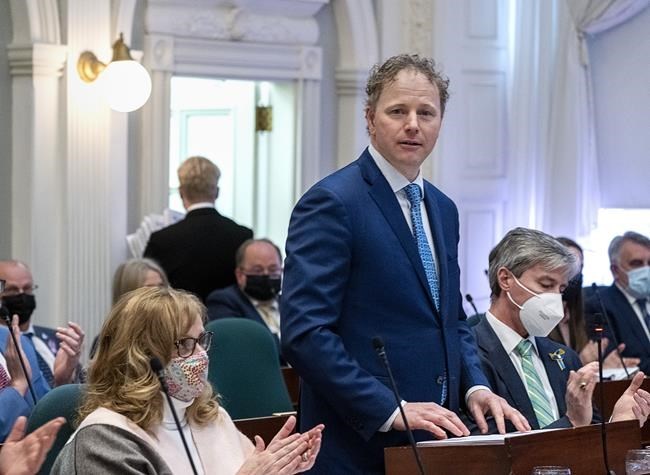HALIFAX — Nova Scotia won’t be using revenue from its fuel tax to help offset the effects of carbon pricing imposed by the federal government, the province’s finance minister said Thursday.
All of the tax collected from fuels — including the 15.5 cents per litre added to the price of gasoline — goes toward fixing the province’s roads, and that won’t change, Allan MacMaster told reporters following a cabinet meeting.
“We prefer targeted supports to help those most in need,” MacMaster said.
He was reacting to Ottawa's announcement earlier this week that by July, the federal price on carbon would be imposed in three of four Atlantic provinces, including Nova Scotia. To help compensate for the tax increases, Ottawa will offer rebates: every three months, households in Newfoundland and Labrador are to receive $328, while the amount will be $248 in Nova Scotia and $240 in P.E.I.
Nova Scotia Liberal MP Kody Blois was the latest to speak out against the province's decision not to offer rebates from the provincial fuel tax — known as the motive fuel tax — which on top of gasoline is charged on diesel, propane, along with aviation and marine fuel.
“I am calling on your government to support Nova Scotians in their time of need,” Blois wrote.
But MacMaster said provinces like Alberta and Newfoundland and Labrador have the flexibility to reduce their taxes because of oil and gas revenues. “They are benefiting from the price of gas going up,” he said. “They’ve got revenue sources to backfill … we don’t have that ability here.”
MacMaster said the province is instead looking at expanding its heating-assistance rebate, which currently offers up to $200 for low-income Nova Scotians who pay for their own heat.
Liberal deputy leader Kelly Regan said she doesn’t buy the government’s line that it can’t provide at least a short-term break at the pumps to help out motorists.
“Other provinces have done it and they absolutely could do it,” Regan said. “They have a windfall on the HST on gas right now because gas prices are so high, so they do have some other money coming in as well.”
On expanding heating assistance, NDP Leader Claudia Chender said she wants to see the program pay out more with a higher threshold set so that more people can receive the help.
Meanwhile, Premier Tim Houston said his province is questioning the formula used by Ottawa to calculate the federal carbon pricing rebate. Houston said the $248 quarterly payments aren’t high enough to counter higher energy and other costs.
He also railed again against the imposition of carbon pricing, adding that he doesn’t believe it will change behaviour in a province like Nova Scotia, where a large rural population has no options for transportation other than personal vehicles.
“We have a productive relationship with them (Ottawa) on a lot of files, but on this particular file we are at odds,” the premier said. “A carbon tax will not help the planet, and it will punish Nova Scotians.”
Natural Resources Minister Tory Rushton said the province is also looking at what it can do to expand its own assistance program for electric heat pumps, in concert with promised federal support.
Rushton confirmed that Nova Scotia is to get about $60 million in home heating assistance from a four-year, $250-million federal funding program announced in September. He said it’s still unknown how much the province will get from an additional $250-million federal grant program announced on Monday, designed to help people replace oil-heating systems with electric heat pumps.
This report by The Canadian Press was first published Nov. 24, 2022.
Keith Doucette, The Canadian Press




